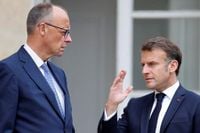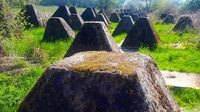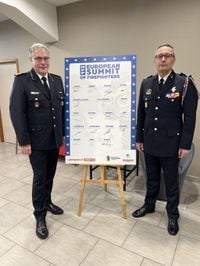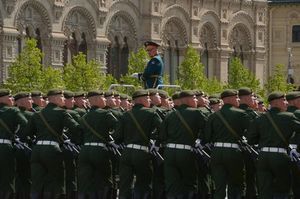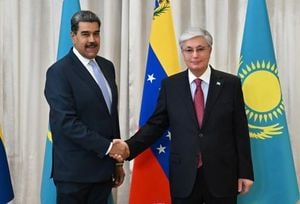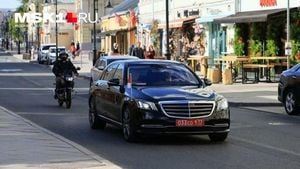In a significant appeal for recognition of their contributions, Karl-Heinz Banse, president of the Deutscher Feuerwehrverband, and Jean-Paul Bosland, president of the Fédération nationale des sapeurs-pompiers de France, have jointly reached out to German Chancellor Friedrich Merz and French President Emmanuel Macron. Their letter, made public on May 7, 2025, emphasizes the vital role of volunteer firefighters in civil protection, a matter they believe deserves greater acknowledgment at both national and European levels.
This appeal comes at a time when France and Germany are intensifying their collaboration on defense and armaments. During Merz's inaugural visit to Paris, Macron announced plans to accelerate Franco-German programs and develop new capabilities, which include the establishment of a Franco-German Defense and Security Council. This council aims to provide operational responses to shared strategic challenges, moving beyond traditional military assets such as tanks and fighter jets.
Macron highlighted the need for increased investments in defense, stating, "We will launch a Franco-German program for innovations in the defense sector to enable groundbreaking innovations necessary for the war of tomorrow." He also called for the implementation of the European Commission's proposed plan to mobilize both private and public funds for the industrial and technological base of European defense.
The backdrop of these discussions is the 80th anniversary of the end of World War II, a moment that resonates deeply in the Franco-German relationship. In Saarbrücken, the Deutsch-Französischer Garten, designed in 1960 as the first cross-border garden show by German and French gardeners, serves as a symbol of reconciliation between the two nations. The garden, situated on 18 bunker systems from the Second World War, reminds visitors of the historical conflicts that once divided them.
As families picnic among the flowers and children play, the garden stands as a testament to the transformation from enmity to friendship. The park's patrons, including the then-German Chancellor Konrad Adenauer and French Prime Minister Michel Debré, envisioned a space that would foster unity and cooperation.
However, the memories of war still linger. An exhibition titled "Endlich Frieden?!" (Finally Peace?!) in front of the Brandenburger Tor, which opened on May 2, 2025, reflects on the painful history and the hope for lasting peace. This exhibition coincides with the anniversary of a symbolic meeting between US and Soviet soldiers in Torgau, which occurred 80 years ago on April 25, 2025, amidst ongoing battles in Berlin.
In Saarbrücken, the local community grapples with its historical legacy. Claudius and Christine, regulars at the nearby restaurant "Zum Ehrental," share their experiences of cross-border life. Claudius, a Saarbrücker, and Christine, originally from Forbach in Lorraine, embody the intertwined lives of many in the region. "It’s like a community," Claudius says, reflecting on the blend of cultures and languages that characterize their daily interactions.
Yet, the specter of war still casts a shadow over their conversations. Claudius expresses concern over the current geopolitical climate, stating, "We are worried that there might be war again." This sentiment echoes the fears of many in the region, who have witnessed the rising tensions in Europe.
Mark Müller, a local enthusiast for history preservation, has founded a club dedicated to maintaining the remnants of the Westwall bunkers, which once served as military fortifications. He notes the increased interest in these sites since the onset of the Ukraine conflict, as people question the feasibility of modern defense strategies. "You can’t protect yourself with today’s weapon technology," he remarks, highlighting the futility of past military strategies.
Steffi Bauer, another member of Müller’s club, tends to the graves of unknown soldiers nearby, emphasizing the shared tragedy of war, regardless of nationality. "They died a senseless death," she states, advocating for the dignified remembrance of all who fell in battle. Her perspective underscores a growing recognition that the past must be honored, not erased.
As the community reflects on its history, the Deutsch-Französischer Garten remains a focal point for dialogue and remembrance. Visitors from both sides of the border come to appreciate the beauty of the gardens while contemplating the lessons of history. The park serves not only as a recreational space but also as a reminder of the shared struggles and the potential for cooperation.
Recent discussions between Macron and Merz signal a renewed commitment to strengthening Franco-German relations. The two leaders aim to turn a new page in their partnership, focusing on collaborative defense initiatives that respond to contemporary challenges. As they work together to enhance their military capabilities, the historical context of their alliance serves as a foundation for future cooperation.
Ultimately, the appeal by Banse and Bosland for the recognition of volunteer firefighters highlights the importance of community contributions to civil protection, particularly in times of crisis. Their call for acknowledgment resonates in a broader context, where the lessons of history and the imperatives of modern security intertwine.
In navigating the complexities of their shared past, the Franco-German partnership continues to evolve, fostering a sense of unity that transcends historical grievances. The commitment to collaboration in defense and civil protection reflects a collective aspiration for peace and stability in a region that has seen its share of conflict.
As both nations look towards the future, the hope is that the spirit of cooperation will prevail, ensuring that the mistakes of the past are not repeated and that the bonds of friendship continue to strengthen.
